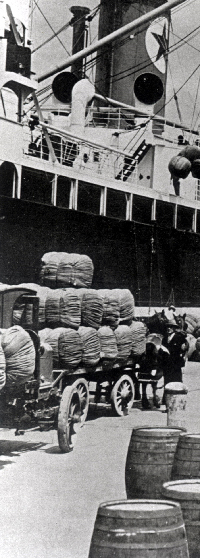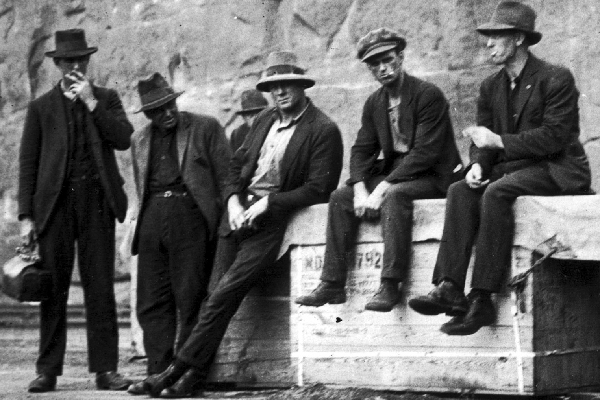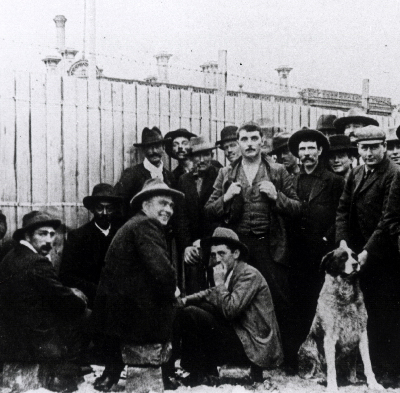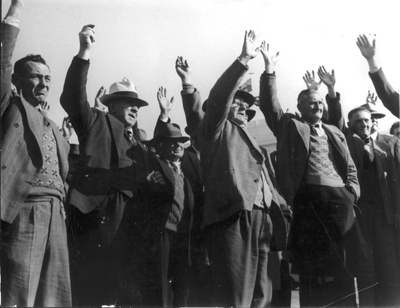Ernest Antony: A Forgotten Poet
An article by Rowan Cahill (October 2006)
 There is little information
on the public record about the radical working class
poet Ernest Antony. He is invariably, and incorrectly,
referred to as Ernest Anthony, and more correctly and
generally referred to as 'a radical poet of the 1930s'. His
poem "The Hungry Mile" is a well known account of
the vicissitudes of life
and work on Sydney's waterfront, but it is often
attributed to 'anonymous' and regarded as a 'folk creation' with
a genesis and life of its
own, not as something created by a specific poet.
There is little information
on the public record about the radical working class
poet Ernest Antony. He is invariably, and incorrectly,
referred to as Ernest Anthony, and more correctly and
generally referred to as 'a radical poet of the 1930s'. His
poem "The Hungry Mile" is a well known account of
the vicissitudes of life
and work on Sydney's waterfront, but it is often
attributed to 'anonymous' and regarded as a 'folk creation' with
a genesis and life of its
own, not as something created by a specific poet.
So who was Ernest Antony? Well, he was an amateur poet who contributed verse about political struggle and working class life to the labour movement press that burgeoned in Australia during the 1920s and 30s. The Workers Weekly, Labor Daily, and the South Coast Times (NSW) were some of the outlets that published his work.
In 1930 Antony published a forty-page volume of poems The Hungry Mile And Other Poems, comprising thirty-three poems, printed by in Sydney by Wright & Baker, a Dixon Street printery owned by the Communist Party of Australia. In his 'Acknowledgement' Antony thanked the Australian left intellectual Esmonde Higgins for "his valuable assistance in preparing this volume for publication". The poems suggest the poet is a widely read person with a satiric, at times bitterly ironic, sense of humour and a combative spirit harking back to the Industrial Workers of the World (IWW). The verse is mainly in the ballad form, is sometimes uneven metrically with quirky punctuation, and was most likely intended to be read aloud.
 In 1957 Sydney wharfie leader and history
enthusiast Tom Nelson published a brief history of Australian
waterfront labour and unionism (with a Sydney emphasis) titled The
Hungry Mile, in which he reprinted the
poem "The Hungry Mile", unattributed. A few years later Ernest's
younger brother Harry Antony wrote a letter to Nelson and
filled him in on his poet-brother's life. The following
information is based on Harry's letter, recently uncovered by the archival
sleuthing
of literary historian Peter Kirkpatrick.
In 1957 Sydney wharfie leader and history
enthusiast Tom Nelson published a brief history of Australian
waterfront labour and unionism (with a Sydney emphasis) titled The
Hungry Mile, in which he reprinted the
poem "The Hungry Mile", unattributed. A few years later Ernest's
younger brother Harry Antony wrote a letter to Nelson and
filled him in on his poet-brother's life. The following
information is based on Harry's letter, recently uncovered by the archival
sleuthing
of literary historian Peter Kirkpatrick.
Ernest was born on a dairy farm
in Victoria, in 1894, the
family later moving to West
Australia where his father variously engaged in road building
and farming. Ernest left school
at the age of thirteen, worked on the land where "a pair of blade shears,
shovel, axe, adze and a team of horses were his tools of trade".
He
left home in 1916 and began a nomadic working life that took
him across Northern Australia,
and down the East Coast as far as Port Melbourne, lumping
wheat, construction jobs, mule and camel team driving, prospecting
for tin and gold, railway
work, timber cutting, cane fields work, waterside labouring.
He was a trade unionist, participated in strikes, gained
a reputation for being a militant,
was variously blacklisted for his involvements, and contributed
poetry to labour movement publications. During the 1930s
he was one of the many men
who unsuccessfully tramped Sydney's Hungry Mile in search
of work. World War 2 saw him employed as a bridge and
wharf carpenter for the duration, and he was prominent in
trade union work.
West
Australia where his father variously engaged in road building
and farming. Ernest left school
at the age of thirteen, worked on the land where "a pair of blade shears,
shovel, axe, adze and a team of horses were his tools of trade".
He
left home in 1916 and began a nomadic working life that took
him across Northern Australia,
and down the East Coast as far as Port Melbourne, lumping
wheat, construction jobs, mule and camel team driving, prospecting
for tin and gold, railway
work, timber cutting, cane fields work, waterside labouring.
He was a trade unionist, participated in strikes, gained
a reputation for being a militant,
was variously blacklisted for his involvements, and contributed
poetry to labour movement publications. During the 1930s
he was one of the many men
who unsuccessfully tramped Sydney's Hungry Mile in search
of work. World War 2 saw him employed as a bridge and
wharf carpenter for the duration, and he was prominent in
trade union work.
After the war Ernest variously worked in West Australia, the  Northern
Territory, and in New South Wales, his work
including market gardening, dog training, cattle driving,
prospecting, and bridge building.
He died on the pension in Gunnedah, NSW, in 1960. As his
brother concluded in his letter to Nelson: "I buried him six feet
under and as far as I know the old bloke is still there.
Also on the way
round he married twice ".
Northern
Territory, and in New South Wales, his work
including market gardening, dog training, cattle driving,
prospecting, and bridge building.
He died on the pension in Gunnedah, NSW, in 1960. As his
brother concluded in his letter to Nelson: "I buried him six feet
under and as far as I know the old bloke is still there.
Also on the way
round he married twice ".
Harry described the working life of his brother thus: "Men who did not see eye to eye with the good kind worthy master were frequently on the move in order to eat and he was of that rebellious order. The swag (and) parts unknown was often his only address".